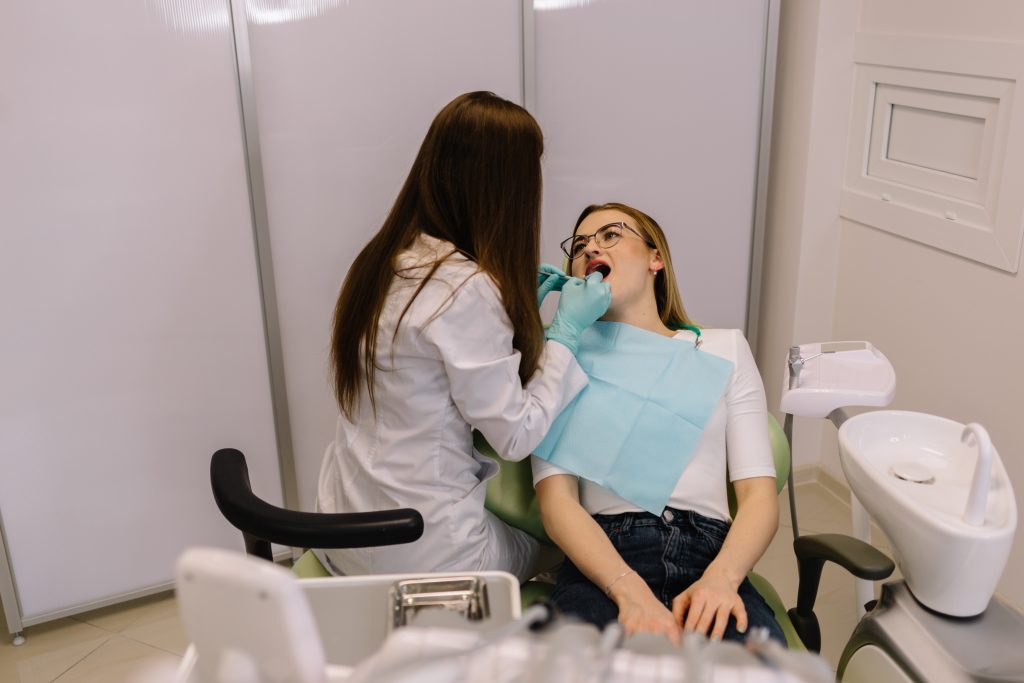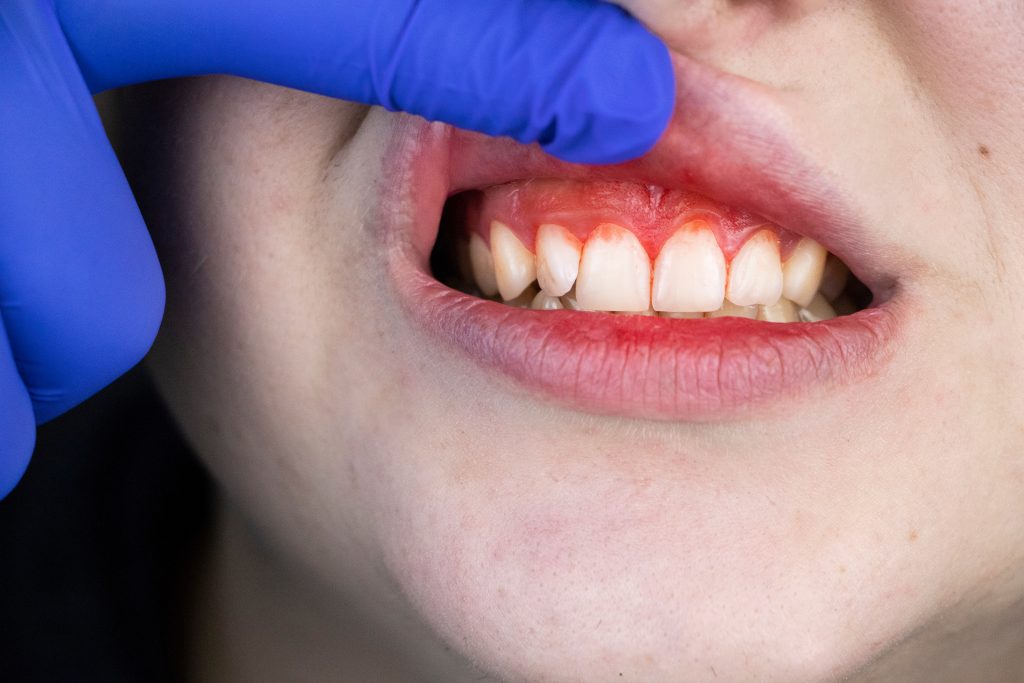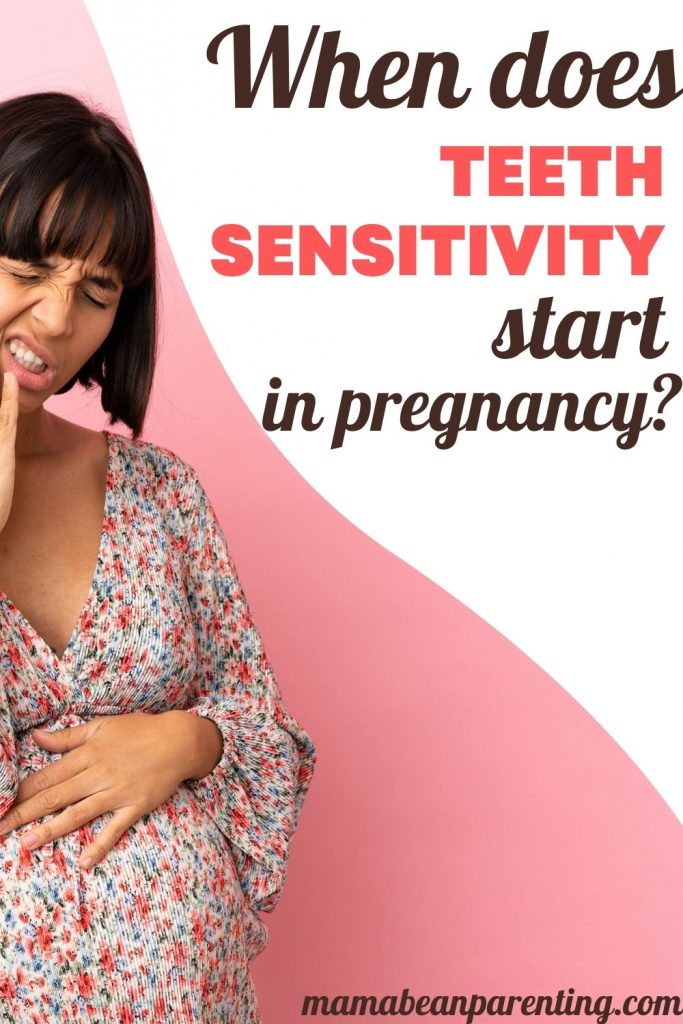When does teeth sensitivity start in pregnancy?
This is a frequent question asked by many future moms.
We’ve all heard about sensitive teeth during pregnancy, and in some cases, women’s teeth became so weak they started to fall out.
Unfortunately, just like some other pregnancy symptoms, sensitive teeth during pregnancy are also something that can affect many women.
Some women don’t have these teeth problems, but others do.
The problem with sensitive teeth during pregnancy and other possible teeth problems is that it’s hard to restore the previous health of the teeth.
Most women who had problems with their teeth during pregnancy keep struggling with their teeth even after they give birth.
If you want to know when does teeth sensitivity start in pregnancy, you’re reading the right article. There are some things you can expect and some things you can do to make this problem easier to solve.
When Does Teeth Sensitivity Start In Pregnancy?

Teeth sensitivity usually starts in the second or third trimester. Some people think of it as an early sign of pregnancy.
However, it is possible that your teeth become sensitive in the first trimester but you probably won’t notice this for a while. This doesn’t mean teeth sensitivity is a pregnancy sign.
Most women realize that their teeth are sensitive later in the pregnancy. It’s also good to know that your gums become sensitive too.
Some women have issues with teeth sensitivity during pregnancy, some have problems with inflamed gums, and some have problems with both.
The main cause for these changes is your hormones and changes in blood circulation and blood flow.
Since you’re pregnant, there are many things in your body happening and you’re not even aware of them. Your blood flow is much faster and stronger to sustain your pregnancy and baby in the womb.
But, your gums could suffer because of that increased blood flow. They became sensitive, red, swollen, painful, and inflamed.
Sensitive gums cause sensitive teeth and gum diseases, and you’re in trouble. Gum disease can cause teeth loss, and you’re in even bigger trouble.
Higher levels of pregnancy hormones – estrogen and progesterone affect your blood flow, but they also loosen the tissues and bones, which is not great when you’re afraid of losing your teeth.
Your immune system is also weaker during pregnancy, so bacteria and other germs find their way into your body.
Another common reason for sensitive teeth during pregnancy is morning sickness and vomiting.
These conditions can be caused by digestive problems and hormonal changes. When you vomit often, your teeth enamel weakens.
This happens because your stomach is filled with stomach acid. That acid is necessary for digesting, and its place is in the stomach.
However, when you vomit, that acid goes up, and it can burn your throat and damage your teeth.
Of course, these things happen when you vomit all the time. If you’ve vomited a few times, you’re safe.
However, if you’ve vomited constantly, buy a good, acid-neutralizing toothpaste. Brushing your teeth after vomiting is logical, but if you brush them with regular toothpaste, you might damage your teeth even more.
Acid-neutralizing toothpaste will remove acid from your teeth and prevent damage.
If you’re out of this toothpaste, try rinsing your mouth a few times with regular water before using normal toothpaste.
Many people believe that teeth loss during pregnancy happens because the baby takes the calcium to itself, and when there is no calcium, teeth become weaker and fall out.
According to experts, this is a myth. Yes, you need calcium for strong and healthy teeth. Yes, the baby needs calcium to develop properly.
But the baby doesn’t take away your calcium. Besides, almost all pregnant women take prenatal vitamins and supplements, including calcium.
I think this myth was real in the past when women had poor diets, poor oral hygiene, and no prenatal supplementation. In those times, many things could cause sensitive teeth during pregnancy.
So now that you know when does teeth sensitivity start in pregnancy, it’s time to learn more about this topic and about methods to deal with the problem.
How To Prevent Teeth Sensitivity During Pregnancy?

Sometimes you can do everything by the book, and you will still have sensitive teeth during pregnancy.
Maybe you were pregnant before, and you know what’s coming, so you want to stop it.
Maybe you are pregnant for the first time, but you have sensitive teeth in general, so you want to know when does teeth sensitivity start in pregnancy so you can prepare.
Maybe you have a toothache during pregnancy, and you’re wondering what the cause is.
Whatever the reason is, you’re here and it’s beneficial for you to learn more about dealing with this problem.
The easiest thing to memorize is when does teeth sensitivity start in pregnancy, but it’s a bit harder to learn how to prevent it and how to deal with it.
Good Oral Hygiene
Good oral hygiene is something that I shouldn’t even discuss. You should take care of your teeth regardless of being pregnant or having sensitive teeth during pregnancy.
However, everybody is different, and we all live in different places and different cultures, so I still want to mention this.
You have to brush your teeth at least two times a day. It would be great if you could brush them after every meal.
Brush your teeth in the morning and before bedtime. Flossing is also very important. Many people think that using teeth floss should only be done when something is stuck between your teeth.
But you should floss every day. There are parts between your teeth that can’t be reached with a toothbrush. Even though you can’t see anything, there is food stuck there.
Flossing will prevent caries, but it will also keep your gums healthy. Now that you’re pregnant and you know when does teeth sensitivity start in pregnancy, it’s time to start flossing as soon as possible.
Since sensitive teeth during pregnancy are usually caused by gum diseases and gum inflammation, you should know that flossing will do wonders for your gums.
Flossing is not only good for your teeth. When you floss regularly, you’re removing all that waste that could irritate your gums.
You’re keeping them clean. Some people use mini brushes called interdental brushes.
These can go between your teeth just like floss can.
It’s also important to use a toothbrush with softer bristles. This will prevent any possible trauma and irritation.
When it comes to toothpaste during pregnancy, you should choose the ones with fluoride. There are many brands with good ingredients that will keep your teeth clean and fresh.
I also recommend cleaning your tongue. You can use your toothbrush or you can buy a tongue scraper.
Many germs can be found on our tongue, and if you have problems with teeth and gums, you should clean your tongue too.
Your immunity is weaker during pregnancy, and everything unexpected can happen.
You can expect sensitive teeth during pregnancy, inflamed gums, bacterial infection, tooth decay, or even skin peeling inside your mouth.
So, at least try to have good oral hygiene because it will certainly help. It’s also beneficial to step up your teeth hygiene so you can teach your future baby how to properly take care of their teeth.
Good oral hygiene will prevent kids’ yellow teeth. It’s also good to educate yourself about dental care in general because your child will need your help.
For example, learning how to pull out a baby’s tooth is a useful thing to know.
Visiting Your Dentist
Many pregnant women avoid the dentist for some reason. There are some procedures that can’t be done during pregnancy, but it’s still important to have a dental exam.
Your dentist will notice some things you can’t see in your mirror at home. If needed, the dentist will give you certain medicine, mouthwash, or toothpaste.
Certain procedures can be done on your teeth during pregnancy, so it’s wise to visit your dentist regularly.
You have to be responsible. Some women go to their dentist to ask if teeth whitening while breastfeeding and pregnant is safe, and you can’t go for a regular appointment?
Please don’t be afraid and don’t be irresponsible when it comes to your dental health. Make your appointment now if you don’t have one already.
Consuming Enough Calcium And Vitamin D
Calcium is very important for our health, especially our heart and dental health. It’s good to use some prenatal calcium supplements to prevent tooth problems. Of course, you should ask your doctor for a recommendation.
Vitamin D is important for our teeth and bones. Find a pregnancy-safe vitamin D and spend enough time outside, because vitamin D needs sunlight to be effective in your body.
Eating A Healthy Diet
Certain nutrients are crucial for good teeth health, but a healthy, balanced diet is also needed if you want to create a good dental care routine.
Our body needs different things to stay healthy and strong. So, if you want to prevent or treat sensitive teeth during pregnancy, eat well.
Protein, vegetables, fruits, and vitamins should be a part of your every meal. Drink a lot of water and avoid unhealthy foods. Avoiding sugary foods and sodas is a must if you’re struggling with sensitive teeth when pregnant.
Also, try to take smaller bites so you don’t hurt yourself if your gums are bleeding or inflamed.
These things aren’t healthy for you even when you’re not dealing with teeth problems. However, they’re not too dangerous in that case.
You have to protect your oral health and you have to choose high-quality foods. Besides, a good diet will help you with many other things.
A balanced diet without unhealthy food is great for pregnancy constipation or morning sickness.
Salt Water And Sage Tea
If your gums are inflamed, bleeding, and painful, gargling some warm, salt water will help with this problem.
Warm sage tea is also great because it stops the bleeding and promotes faster healing.
Just make sure you don’t swallow these fluids. Some people like to use hydrogen peroxide. This is not a bad option, but it could be a bit harsh because it will give you a burning sensation.
You can also ask your dentist for some medicinal mouthwash that’s safe for pregnant women when they have gum disease.
Keeping your mouth moist will promote faster healing, but it’s good to use something with beneficial ingredients.
Gum Massage
Massaging your gums is a great way to prevent and treat sensitive teeth during pregnancy. If your gums are inflamed and bleeding, it will be painful to massage them, but it will help.
Be gentle, and use a gum massager, soft bristle toothbrush, or your finger. This will help with the healing and it will reduce the pain.
You can also try using something cold to alleviate the pain. Some frozen fruit or a frozen gum massager should do the work.
Gum massage is recommended for people who deal with teeth loss, gingivitis, or periodontitis. Therefore, if you’re afraid of losing your teeth, gum massage could be your solution.
Oil Pulling
Many people use oil pulling for good oral health and tooth sensitivity. It’s great for removing teeth plaque, build-up, and bad smells.
Some people claim that regular oil pulling can whiten teeth, and cure gum disease, and other oral infections. Some people say that oil pulling can regenerate tooth enamel, reduce tooth sensitivity, and strengthen your teeth.
You just need a tablespoon of coconut oil. Put it in your mouth, and swirl it around for 20 minutes and spit it out in a trash can. If you do it in the sink, you might clog your drain.
It will feel weird in the beginning, but you will see benefits very soon. Many experts believe that oil pulling is great for your general health because it can remove toxins.
You can use some other oils, but it’s important they’re organic and non-toxic. Experienced oil-pullers say that coconut oil is the best one if you want a teeth-whitening effect.
Oil pulling will strengthen your teeth, gums and it will reduce inflammation in your mouth.
Pregnancy Gingivitis

One of the most common gum diseases is gingivitis. It’s a condition where your gums are inflamed, painful, and bleeding.
I’ve explained why our gums and teeth are so affected by a pregnancy, so you shouldn’t feel guilty if you have this condition. Sometimes it can be a consequence of bad oral hygiene, but I believe you did a good job.
Just like with sensitive teeth during pregnancy, good oral hygiene, flossing, visiting a dentist, and a good diet are the way to deal with this condition.
I also suggest gum massage, gargling salty water or sage tea, and oil pulling. However, if your pregnancy gingivitis is persistent because of increased blood flow, you have to go to your dentist to do something about it.
When gingivitis is persistent, it can lead to infection and periodontitis. Periodontitis is a condition when your gums start to pull away from your teeth.
This can cause loose teeth and teeth loss. It can also cause “pockets” between your gums and teeth which are painful and often infected.
This is why it’s important to see your dentist. In most cases, if your gums started to pull away, a dentist has to clean those pockets to prevent infection and teeth loss.
Pregnancy gingivitis is not dangerous for your baby, but it’s very painful and uncomfortable. If you don’t treat it, it could lead to losing weight since you can’t eat normally.
Losing weight during pregnancy can cause other complications with your health and your unborn child.
If your gingivitis causes periodontitis, that could cause an infection. Any kind of infection during pregnancy is a possible risk.
If you did get an infection, the doctor will give you antibiotics and prescription mouthwash.
It’s always hard to find effective antibiotics for pregnant women, so it’s always better to prevent infections in the first place.
If a doctor determines that your gingivitis or periodontitis is serious, you might have to get an X-ray.
Dental X-ray or any kind of X-ray is not recommended during pregnancy. Radiation can cause problems with your baby and it’s better to avoid it.
Of course, if a doctor tells you it’s needed, you will have to follow some special measures and rules to protect your baby from radiation.
As you can see, teeth problems are not just about you and your beautiful teeth. Some things can always lead to something else which can be harmful to your baby or unsafe for your pregnancy.
Every part of your body is equally important. Take care of oral health and find a way to prevent negative outcomes and tooth sensitivity.
Natural Teeth Remedies

Before I give you some great suggestions of natural teeth remedies that are great for strengthening teeth and preventing tooth sensitivity, you have to know that regular dental care is a must.
Also, don’t forget about visiting a dentist. You need a good dentist for your dental health and if you’re not happy with your current doctor, find another one.
But I always like to use something from nature or something homemade. We need to use everything nature gives us.
Clove Oil
Clove oil is a natural anesthetic because it contains eugenol. This is an essential oil so it shouldn’t be used alone. You will need a carrier oil, such as coconut oil.
Eugenol from clove oil can reduce pain, and that’s why many people, including pregnant ladies, use it for treating toothache.
Many studies have shown that clove oil is also great as an inflammatory agent. This means it’s great for swollen, inflamed gums too. It promotes healing and regeneration.
I recommend mixing a few drops of clove oil with coconut oil and dabbing it on your teeth and gums.
If you start oil pulling regularly, it’s a good idea to add clove oil to your coconut oil.
Find a high-quality clove oil follow the directions to avoid side effects, and enjoy your natural teeth remedy. Clove oil can be used for treating pain and inflammation in other body parts too. Some pain-relief gels for sore muscles contain clove oil.
Peppermint Oil
Peppermint oil should also be used as clove oil – by mixing it with a carrier oil. Peppermint oil is great for preventing inflammation and tooth decay. It’s also great for getting rid of bad breath.
Many studies have shown that peppermint oil kills bacteria and other germs. Thyme oil has the same effect as peppermint oil, so that you can use it for the same purpose.
Cinnamon
Since avoiding sugar is good for your teeth and oral health, using cinnamon to make tasty desserts is a great trick.
What is also great about cinnamon is its antifungal and antibacterial properties. Cinnamon oil is even more effective if you want to prevent teeth problems.
A great treat to make is apple slices with cinnamon. Apple is also suitable for teeth, and in combination with cinnamon, it tastes great.
Strawberries
Many people use crushed strawberries to whiten their teeth naturally. You can use this strawberry paste once a week to clean your teeth thoroughly.
I also suggest eating strawberries. They taste good and they’re filled with vitamins that are essential for healthy gums and teeth.
Eating strawberries will help you to stay away from sugary food. So, apples, strawberries, and cinnamon are your friends if you want to have good teeth!
Conclusion

The easiest thing about this whole topic is learning when does teeth sensitivity start in pregnancy.
Having tooth sensitivity is never fun, and having problems with drinking hot or cold drinks is also annoying. There are some things to prevent this, but you have to make an effort.
You have to work hard on some good habits if you want to prevent teeth sensitivity, swollen gums, gingivitis, or other possible conditions.
Pregnancy can truly be the hardest part of your life. So many pregnant women experience many uncomfortable things.
Morning sickness, nausea, back pain, exhaustion, and problems with oral health are some possible problems.
Some things can be avoided no matter how hard you work on them. Still, it’s always better to give your best to prevent certain things.
You will feel good knowing you’re working hard to protect yourself.
Just imagine how would you feel if you did nothing to prevent some negative situations. Keep learning and keep trying to stay healthy and well. Taking care of your teeth is a must.
Teeth are important for normal functioning, eating, digestion, and appearance too. Don’t give up on them no matter what.
Hi all, I am Sidney, an accountant, a hobbyist photographer, and a mother to two sweet girls who are my motivation. I love sharing the tips and tricks I gained all these years I’ve been a mother. I hope it will help you!


